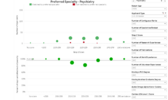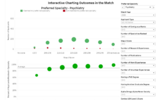- Joined
- Mar 16, 2019
- Messages
- 166
- Reaction score
- 59
Hey all- I was curious if anyone else has noticed an improvement in the quality of psychiatry matches at your DO institution since the merger? I've been following the stats and the DO match rate into psych has gone up quite a bit this year (from low/mid 80s to low 90s), which is the highest it's ever been. Anecdotally and subjectively, the 'quality of psychiatry matches' (defined by me as proportion matching into an academic psych residency) seems to have improved at the few DO programs I've been following since 2018.
Interested in finding out if anyone else has noticed any such trends since the merger. This would make sense given that DOs are now in the same priority category with MD grads. Coincidentally, the FMG match rate into psychiatry has gone down recently (now in mid 30s), which also makes sense, given DO applicants are now being prioritized over FMGs.
Interested in finding out if anyone else has noticed any such trends since the merger. This would make sense given that DOs are now in the same priority category with MD grads. Coincidentally, the FMG match rate into psychiatry has gone down recently (now in mid 30s), which also makes sense, given DO applicants are now being prioritized over FMGs.


